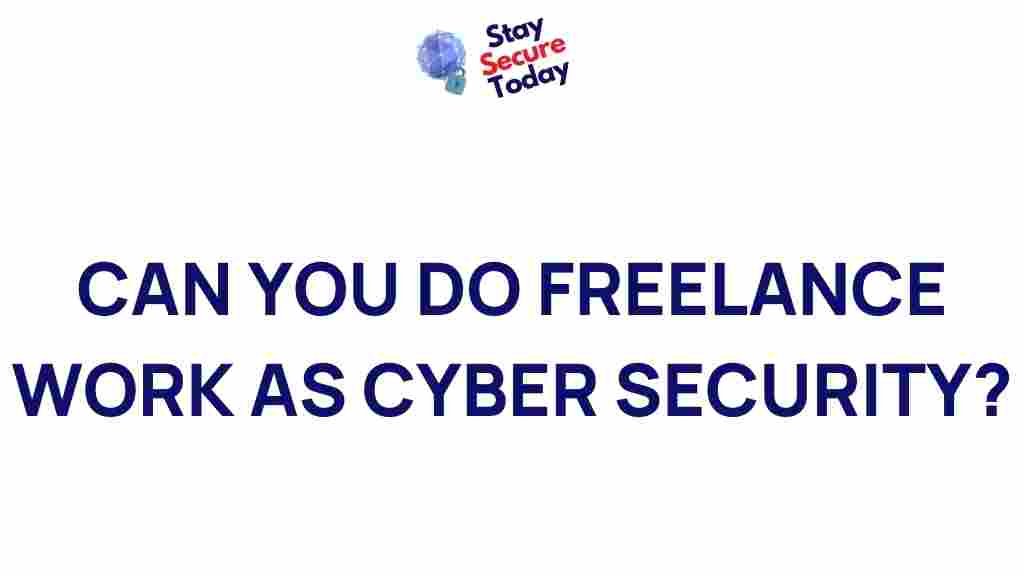Freelance Work: Unleashing Your Potential in Cybersecurity
In today’s rapidly evolving digital landscape, cybersecurity has emerged as one of the most crucial fields. With increasing threats and vulnerabilities, businesses are seeking experts to help safeguard their systems. For those looking to carve out a niche in this lucrative industry, freelance work offers unparalleled opportunities. This article delves into the world of freelancing in cybersecurity, helping you understand how to unleash your potential and thrive as a freelance professional.
The Rise of Freelance Work in Cybersecurity
As technology advances, the demand for cybersecurity professionals continues to grow. Many companies are turning to freelancers for several reasons:
- Cost-Effectiveness: Freelancers can offer specialized skills without the overhead costs associated with full-time employees.
- Flexibility: Businesses can hire freelancers on a project basis, allowing them to scale their workforce according to their needs.
- Access to Global Talent: Companies can find the right skills no matter where the freelancer is located.
For freelancers, this shift presents an incredible opportunity to build a career in cybersecurity while enjoying the flexibility and autonomy that comes with freelance work.
Identifying Your Niche in Cybersecurity
The first step to succeeding in freelance work is identifying your niche. Cybersecurity encompasses various specialties, including:
- Pentration Testing: Simulating attacks to identify vulnerabilities.
- Incident Response: Handling security breaches and minimizing damage.
- Compliance and Risk Management: Ensuring organizations adhere to laws and regulations.
- Security Architecture: Designing secure systems and networks.
By pinpointing your niche, you can focus your efforts and market yourself more effectively. Consider your skills, interests, and the current market demand when choosing your specialization.
Building Your Skill Set
Freelance work in cybersecurity requires a robust skill set. Here are essential skills to consider developing:
- Technical Proficiency: Familiarity with security tools and software is crucial.
- Problem-Solving: The ability to think critically and devise effective solutions.
- Communication: Being able to explain complex concepts to non-technical stakeholders.
- Continuous Learning: Staying updated with the latest trends and threats in cybersecurity.
Investing in online courses, certifications, and practical experience will enhance your qualifications and make you more appealing to potential clients.
Creating Your Freelance Profile
Once you have established your niche and skill set, it’s time to create a compelling freelance profile. Here are key elements to include:
- Professional Summary: Write a brief overview of your experience and skills.
- Portfolio: Showcase your previous work or projects that demonstrate your capabilities.
- Certifications: List any relevant certifications or degrees to validate your expertise.
- Client Testimonials: Positive feedback from previous clients can significantly boost your credibility.
Use platforms like Upwork or Freelancer to create your profile and start bidding on projects.
Finding Freelance Opportunities
Now that your profile is ready, you need to find freelance work. Here are some effective strategies:
- Online Job Platforms: Utilize freelance job boards to find listings specific to cybersecurity.
- Networking: Join cybersecurity forums and LinkedIn groups to connect with potential clients and other professionals.
- Personal Website: Create a website showcasing your services, portfolio, and blog posts about cybersecurity topics.
- Cold Outreach: Reach out directly to companies that may benefit from your services.
Building relationships and maintaining a presence in the industry will help you secure more freelance work.
Setting Your Rates
Determining your rates can be challenging, especially in a competitive market. Consider these factors when setting your prices:
- Your Skill Level: More experienced freelancers can charge higher rates.
- Market Rates: Research what others in your niche are charging.
- Project Complexity: More complex projects may justify higher fees.
- Time Commitment: Estimate how many hours a project will take you and price accordingly.
Don’t be afraid to adjust your rates as you gain more experience and build your reputation.
Delivering Exceptional Work
To thrive in freelance work, it’s crucial to deliver high-quality results consistently. Here are some tips:
- Understand Client Needs: Communicate with clients to fully understand their requirements and expectations.
- Set Realistic Deadlines: Ensure that you can meet deadlines without compromising quality.
- Seek Feedback: After completing projects, ask clients for feedback to improve your services.
- Maintain Professionalism: Keep communication clear and professional, and meet your commitments.
Providing excellent service will lead to repeat business and referrals, essential for building a successful freelance career.
Troubleshooting Common Freelancing Issues
Freelancing can come with its challenges. Here are common issues and how to troubleshoot them:
- Inconsistent Income: Consider diversifying your client base to stabilize your income.
- Client Disputes: Maintain clear contracts and communicate expectations upfront to avoid misunderstandings.
- Time Management: Use project management tools to organize your tasks and deadlines effectively.
- Burnout: Ensure you take breaks and set boundaries between work and personal life to prevent exhaustion.
By proactively addressing these challenges, you can maintain a healthy and productive freelance career.
The Future of Freelance Work in Cybersecurity
The future looks bright for freelancers in cybersecurity. With the increasing reliance on digital solutions and the corresponding rise in cyber threats, the demand for skilled professionals will only continue to grow. As a freelancer, you have the opportunity to:
- Work on Diverse Projects: Engage with various clients across different industries.
- Stay Ahead of the Curve: Continuously learn and adapt to new technologies and threats.
- Build a Personal Brand: Establish yourself as an expert in your niche.
By staying proactive and committed, you can thrive in this exciting and rewarding field.
Conclusion
Freelance work in cybersecurity offers a pathway to unleash your potential and create a fulfilling career. By identifying your niche, building your skill set, and delivering exceptional work, you can navigate this dynamic landscape successfully. Embrace the opportunities that freelancing presents, and take control of your professional journey in cybersecurity.
For more insights and tips on freelancing in various fields, check out our comprehensive guide here.
This article is in the category News and created by StaySecureToday Team
